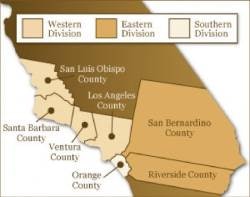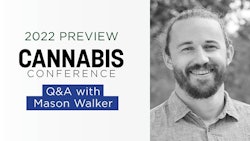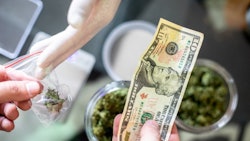
California’s coastal “King of Cannabis,” Helios Dayspring, owner of a San Luis Obispo cannabis cultivation site, supplier to many licensed California dispensaries, and founder of Central California’s Natural Healing Center dispensary, was sentenced to a 22-month prison sentence, in a downtown Los Angeles federal courtroom May 27.
Dayspring was also ordered to pay almost $3.5 million in back taxes to the IRS from years of unreported cannabis business income.
Dayspring, over a three-year period starting in 2016, bribed a San Luis Obispo county supervisor with money, free cannabis, and fancy meals, so that the local government official would vote in favor of policies which favored Dayspring’s San Luis Obispo cannabis farm and his Grover Beach, California retail outlet.
RELATED: Q: What’s a Cannabis Operator to Do to Get Ahead Without Getting Indicted?
Dayspring’s cannabis corruption machinations were discovered after federal authorities began a multi-year investigation into local government corruption up the California coast.

Why did the feds in this vast Central District, home to 19 million inhabitants and covering 40,000 square miles, single out Dayspring? They were investigating corruption, not cannabis.
Even though cannabis production and distribution is legal in California, it remains illegally federally. But it was not cannabis that put the authorities on the scent. It was because Dayspring acted “corruptly” by using money, cannabis and free food, to influence a local public office holder. Not understood by some, the feds have broad jurisdiction to investigate and prosecute cases at the local and state level—so long as there is a “federal interest.” Bribery of a state or local official is a federal crime where the locality or the state has received in excess of $10,000 for any federal program (which could be food stamps or even highway reconstruction money). San Luis Obispo’s budget includes federal program funds, hence the interest.
Notably, the federal prosecutor on the case was not from the Central District’s Narcotics Division. The federal prosecutor, Thomas Rybarczyk, is assigned to the Public Corruption Unit.
It was Rybarczyk, at Dayspring’s in-person federal court sentencing hearing, who honed in on Dayspring’s actions involving the government official. Other than referring to Dayspring as a “cannabis king” who wanted to expand his empire by cheating, there was little mention of cannabis at all. And no mention of cannabis’ federal illegality. Rybarczyk implored the court to punish Dayspring for “trying to fix the game” so no other operator could fairly compete.
Dayspring was sentenced last week after pleading guilty in October 2021 to a two-count federal complaint. Count One charged federal bribery and Count Two charged that Dayspring intentionally under-reported his business income on his federal tax returns.
Dayspring asserted that he was led astray by his prior lawyer (whom he wrongly thought had “expertise” with the complications and hurdles of cannabis businesses). One of Dayspring’s current lawyers, Sandra Brown, herself a former Central District federal prosecutor, spoke on Dayspring’s behalf at the sentencing hearing. Brown attributed some of the blame to Dayspring’s prior lawyer, as well, for suggesting that Dayspring bribe the county supervisor, “advice” that Brown described as “not just incorrect, but frankly illegal.”
Rybarczyk, for the government, and the federal judge (who also was a former federal prosecutor in the Central District), would have none of that and attributed all blame for the corrupt behavior to Dayspring alone. Judge Andre’ Birotte told the parties “no one forced him to do it.” The court, however, did show some leniency, sentencing Dayspring to five fewer months than the prosecutor had recommended. Plus, Dayspring’s 22-month sentence was well below the statutory maximum sentence of 13 years for the two offenses combined.
Since Dayspring was not deemed a flight risk and apparently since he had already paid the IRS the millions of back taxes, he was permitted to leave the courtroom, go home, and self-surrender to start serving his prison sentence near summer’s end on Aug. 26.
Cannabis Operators Must Not Cross the Ethical Line
So, what’s the main takeaway for licensed cannabis business operators?
Dayspring’s case provides an important lesson. He crossed the ethical line. Cannabis operators, who already—at day one—are conducting a business that is federally illegal, cannot afford to engage in conduct that is “additionally criminal.” It adds insult to injury to add political corruption and failure to pay back taxes to the mix. Any operator—even one who does not engage in corruption and declares all income—could still be subject to federal arrest and prosecution just for “being in the business.”
Why make oneself so susceptible to federal prosecution when the better course is to lay low and follow the rules?
It’s not far-fetched to believe that the feds are watching what is happening at a town’s city council, board of supervisors, or zoning commission.
Dayspring’s experience should serve as a warning to other operators. Do not “corruptly” influence political decision makers. This means: Do not slip them cash, provide them with free cannabis or with any free meals (big or small). In Dayspring’s case, $29,000 was the amount of money handed to the official and $3,000 was the value of “in-kind” gifts of food and cannabis provided by Dayspring. This means that even little bits (think ounces not kilos) of product and a few restaurant meals with wine spread out over years can amount to federal bribery.
Resist the temptation to engage in such conduct. And in small towns and counties, access can increase temptation. There, townspeople run into each other more frequently and have more daily opportunities to interact with the local level officials who are making licensing and zoning decisions.
Understand the Federal Government’s Ability (and Broad Authority) to Find Out What They Want About Those ‘in the Business’
Invariably, a federal corruption or fraud case will involve money that was not reported to the IRS. A smart federal prosecutor will bring in an IRS special agent to join a public corruption investigation and investigate the tax angle. Prosecutors often call tax charges, “the easy low-hanging fruit” because once a target’s expenditures are compared with the income reported, if the disparity is extreme the feds are likely have an easy-to-prove tax prosecution.
Once the IRS is aboard a federal criminal investigation, it becomes easier for the prosecutor to get copies of the target’s federal tax returns without a court order. The IRS agent, often with the help of an IRS revenue analyst, will then comb through a target’s bank statements, credit and debit card statements, business records, and federal filings (to include currency transaction reports, CTRs) and compare that information with a target’s tax returns. That happened here with Dayspring.
The federal agents dove into Dayspring’s financial information for a period of years to include years before Dayspring’s bribery of the local official. The result? Caught dead-to-rights, Dayspring entered a plea deal where even though he agreed that he under-reported $6.5 million of cannabis business proceeds for a single year (2018), he had to accept criminal responsibility and promise to pay four years of back taxes totaling just under $3.5 million.
And with the hope that such a payment to the IRS would increase the chances of a lower sentence than the statutory max of 13 years, Dayspring’s current lawyers advised him to pay in full, which he did before his sentencing. Surely, the judge took that fact into consideration when imposing Dayspring’s 22-month sentence under federal guideline sentence.
Dayspring’s tax practices should serve as a lesson to those in the cannabis business. All cannabis operators are required to pay their taxes. It does not matter whether the product being grown or sold is illegal in any regard. The duty to pay taxes is irrespective of the legality of the business. Keeping sloppy books or two sets of books or no books—or, certainly, not reporting all cannabis income— can result in federal criminal tax charges.
One Last Takeaway? Your Phone Is Subject to Searches, Too
What nailed the coffin shut for Dayspring, in addition to the financial record analysis, was his overuse of the text message function on his iPhone.
During the investigation, the federal authorities acquired the texts between Dayspring and the town supervisor. The defendant’s own words made clear that the money, meals, and gifts of cannabis were in exchange for political action to benefit Dayspring.
In one text chain from December 2018, Dayspring asked for the official to continue to postpone new cannabis regulations that would negatively impact Dayspring’s businesses and would let competitors into the field.
DAYSPRING: "It's really important you guys extend the time frame for submission and don't allow other people in yet [as] [t]his affects all the properties that I just got investment into, every one of them. If I am not deemed complete and get accepted, conditional use permits, I don't get my ownership in the land."
COUNTY SUPERVISOR: "Got it. We'll see what we can do...”
After that exchange, two days later, the county supervisor texted Dayspring that the official had been successful.
In another over-the-top text exchange, the county official texted that his birthday was around the corner and what was Dayspring going to do for him. Text message: "Tomorrow is your favorite County Supervisor's birthday…”
The federal agents got records from a Pismo Beach restaurant where the birthday meal for the supervisor was held. The authorities also discovered that $5,000 cash from Dayspring had been provided to the birthday celebrant.
Get The Best Legal Perspectives From Former Federal Prosecutors and/or ‘Big Firms’ Or Firms That Specialize In Cannabis Regulatory and Transactional Work
From my view, as a former federal prosecutor, and someone who teaches cannabis law in both business and law schools, Dayspring’s biggest mistake (besides the criminality) was not doing enough investigation to find the right lawyers initially (at the start of his business) to guide him.
As state legalization regimes proliferate across the political spectrum and as states institute licensing regimes that give the power to say “yes” or “no” to cities, towns, and counties (big and small), political corruption opportunities will expand.
Cannabis business operators need experienced lawyers to guide them. Not all lawyers have the skill set to do so. It is the obligation of the operator to identify the right lawyer for the job. The operator must ask specific and pointed questions of any lawyer under consideration, even one hired for an initial (one-shot) consultation.
They are:
- Have you ever tried a case in federal court?
- Have you ever worked as a federal prosecutor?
- Are you working at a law firm with 50 or more lawyers with offices in other states? (also known as “Big Law”) or have you worked at “Big Law” and are now in a specialty or boutique firm that advises big business on such things as tax, land use, employment, mergers and acquisitions (M&A)?
- Have you assisted five or more individuals or entities (in separate and unrelated matters) in preparing and submitting five separate and unrelated cannabis licensing applications to government authorities?
- Have you assisted five or more individuals or entities (in separate and unrelated matters) with preparing and submitting to government authorities five separate and unrelated local licensing or zoning or land use (conditional use) permits?
If the lawyer answers “yes” to any single question (1 to 5), the lawyer can be considered for hiring to give a consultation and then, with more questions asked, to be considered as an occasional legal consultant, or even as someone to place on the payroll.
The most important question of the five? Has the lawyer assisted and prepared five separate and unrelated cannabis licensing applications?
There are also questions that can weed out the wrong lawyer for the cannabis operator. They are:
- Do you defend (in state and local courts) individuals charged with cannabis possession and/or distribution?
- Do you defend people charged with other crimes to include drunk driving and assault?
- Do you represent people in family law matters to include divorce and child custody?
A lawyer who represents those charged with cannabis crimes in state and local courts (to include possession and distribution) and/or who represents defendants charged with non-cannabis related crimes (to include drunk driving and assault) is not often the right lawyer to represent cannabis operators with licensing applications and regulatory matters.
Those admirable criminal defense warriors who ensure that every defendant is represented and that all defendants have their day in court are to be heralded. They put state and local prosecutors “through their paces.” Family lawyers (who handle marriage break ups and custody decisions) often do heartbreaking and essential work too.
But even though some criminal defense lawyers and family lawyers have “cannabis-related” law practices, and some refer to themselves as “cannabis lawyers,” they are not generally equipped to provide quality regulatory and transactional services to the cannabis operator.
The “cannabis lawyers” are typically not of the same caliber as Big Law regulatory and transactional lawyers or as those formerly part of Big Law who start or join specialty practices (such as tax and land use). Big Law, specialty, and/or former federal prosecutors who handle cannabis industry work, as a general rule, intimately know the ins and outs of cannabis licensure and have handled complex cannabis regulatory and/or transactional matters. Their law firms also have the personnel resources (to include support staff) to excel in the morass of licensing and regulatory hurdles.
Many of the Big Law, former federal prosecutors or specialty firm lawyers who advise single state operators, MSOs, and brands in the cannabis industry, are loath to ever refer to themselves as “cannabis lawyers.” In fact, they tend to chafe at the moniker and affirmatively tell prospective clients, “I am not a cannabis lawyer.” The lawyer-experts go on to explain that they have expertise in the wide array of laws, regulations and practices affecting the industry and things from their perspectives “self-proclaimed cannabis lawyers do not.”
Brad Sodowick, a professor at Drexel University’s LeBow School of Business who teaches a course called “Cannabis as an Emerging Business” has advice for all cannabis operators on this point: “Get a former federal prosecutor and/or someone at a big firm or who worked at Big Law and not a solo-shop criminal defense attorney who represents marijuana dealers. Pay for expert consultation before starting the business, not after paying a bribe to a local official.”
Dayspring should have talked to the professor first. Bets are on that Dayspring’s first lawyer—the one who (according to Dayspring) encouraged the bribes to the county supervisor, would not have been Dayspring’s lawyer had Dayspring asked the right questions before engaging in the corrupt behavior.
Dayspring’s downfall is a warning to all.
Julie A. Werner-Simon is a former federal prosecutor, former constitutional law fellow, and currently serves as a law professor (adjunct) at University of Southern California’s Gould School of Law, Drexel University’s Kline School of Law, and is also a legal analyst at Drexel’s LeBow School of Business.


























